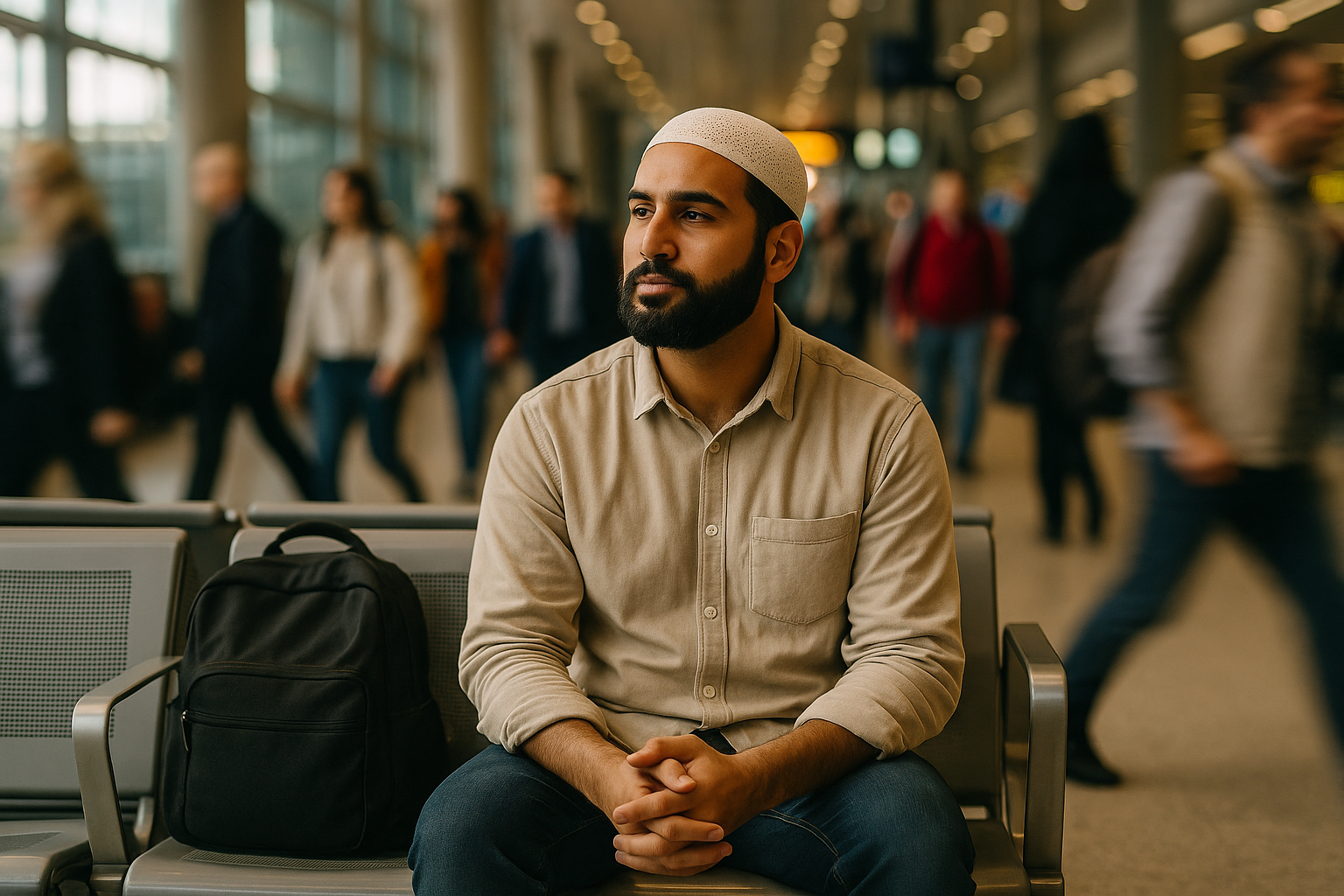The Traveller's Mindset: How Islamic Travel Etiquette Can Reduce Modern Anxiety

Strong 8k brings an ultra-HD IPTV experience to your living room and your pocket.
In today's fast-paced world, where travel is often packed with relentless schedules, demands, rush and deadlines, many travellers return home more exhausted than refreshed. But for Muslims, travel is not just a logistical undertaking, it's a profound opportunity that allows you to reflect, repent and remember Allah (SWT).
Islamic travel etiquette offers timeless teachings to increase mindfulness, reduce anxiety, uphold faith and align every step of the journey with the remembrance of Allah (SWT). This travel approach not only makes the trip smoother and hassle-free but also makes it meaningful.
In this blog, we will explore how the Islamic mindset of travel can help face the challenges of modern travel with clarity, calmness and spiritual peace.
1. Begin with Niyyah: Intentional Travel for Allah's Sake
Not only travel, but every act you do should begin with the right intentions. When planning your journey, start with sincere intention and travel for Allah's (SWT) sake. Every action in Islam begins with intention, and the reward of the actions will be given based on the intention.
" Actions are judged by intentions "
(Bukhari & Muslim)
When you travel with true intentions, whether for Hajj, Umrah, seeking knowledge, business, or exploring the creations of Allah (SWT), you automatically reframe your mindset.
This clarity of purpose reduces anxiety, grounds your actions in ibadah, and reminds you that you're not wandering aimlessly, but moving with purpose.
2. Du’a for Travel: Grounding Yourself in Divine Protection
Our beloved Prophet Muhammad (PBUH) taught specific du'as for travel that provide blessings, psychological reassurance, and protect you throughout the journey.
It was also reported that the Prophet Muhammad (PBUH) said;
"There are three supplications that will undoubtedly be answered: the supplication of one who has been wronged; the supplication of the traveler; and the supplication of a father for his child."
Sunan Ibn Majah 3862
This profound hadith reminds us that Allah (SWT) fulfils the du'a of the travellers, so before leaving your home, during your journey and while returning, take time to sincerely supplicate. Ask Allah (SWT) for protection, guidance, ease, and barakah.
When the Prophet Muhammad (PBUH) travelled, he would say:
" اللَّهُمَّ إِنِّي أَعُوذُ بِكَ مِنْ وَعْثَاءِ السَّفَرِ وَكَآبَةِ الْمُنْقَلَبِ وَالْحَوْرِ بَعْدَ الْكَوْرِ وَدَعْوَةِ الْمَظْلُومِ وَسُوءِ الْمَنْظَرِ فِي الأَهْلِ وَالْمَالِ
Translation: O Allah, I seek refuge with You from the hardships of travel and the sorrows of return, from loss after plenty, from the supplication of the one who has been wronged, and seeing some calamity befall my family or wealth.
Supplication engages your mind spiritually, invites divine protection, and creates a sense of trust that helps reduce the unknown-related stress many travellers feel.
3. Trust in Qadr: Accepting Delays and Changes
Islam teaches us that everything that happens in the universe is by the will of Allah (SWT), even the leaves that fall from the tree, the rivers that flow, and the Sun that rises; everything is by His will.
So when travelling, you may face delays, missed flights, cancellations, and hardships; all these are part of Qadr (Divine decree).
The Messenger of Allah (ﷺ) said:
"'The strong believer is better and more beloved to Allah than the weak believer, although both are good. Strive for that which will benefit you, seek the help of Allah, and do not feel helpless. If anything befalls you, do not say, "if only I had done such and such" rather say "Qaddara Allahu wa ma sha'a fa'ala"
(Allah has decreed and what He willed has occurred.)
Sunan Ibn Majah 79
Instead of frustration, travellers should respond with Sabr and Tawakkul.
This mindset is transformative. It shifts your mental energy away from anxiety toward acceptance, gratitude, and serenity.
4. Travel Light — Physically and Spiritually
One of the Sunnah, that Muslims are encouraged to follow while travelling, is to travel with Minimalism. This Sunnah is not limited to minimal luggage, but also freeing yourself from emotional and mental burdens, stress and worldly attachments. Avoiding stress over your appearance, consumption, luxury, and extravagant stays can help make your journey more spiritually enriching.
As the Prophet ﷺ said:
"Be in this world as if you were a stranger or a traveller."
(Bukhari)
The less you carry, the freer you are to gain more Barakah. With minimalism, travel becomes less about indulgence and more about gratitude, reflection and strengthening connection with Allah (SWT).
5. Respect Others: Group Etiquette and Social Awareness
Islamic travel etiquette emphasises sabr (patience), kindness and cooperation with fellow travellers. Travelling in a group is itself an act of Sunnah, but you should be mindful of several other things. Whether you and your group are waiting at an airport, eating together or travelling in a bus, Islam teaches us to greet others, offer help and create harmony.
The Messenger of Allah (ﷺ) said, "When three persons set out on a journey, they should appoint one of them as their leader."
[Abu Dawud]
Appointing a group leader helps to promote communication, accountability and order. This collective mindfulness reduces group tension, travel-related disputes, and creates an environment of mutual respect, something modern group tours often lack.
6. Time Management and Prioritising Salah
Travel is enjoyable, but it disrupts your routine. For Muslim travellers, it’s essential to stay mindful of time management and prioritise Salah, no matter where the journey leads. For travellers, Islam offers concessions like Qasr (shortened prayers) and Jama', combining Dhuhr with Asr or Maghrib with Isha to ease hardship.
Planning your prayers, carrying a travel prayer mat, a small compass or digital apps, all help keep your connection with Allah (SWT) intact.
This not only reduces guilt and anxiety about missed prayers but also aligns your journey around spiritual discipline.
7. Mindful Consumption and Halal Choices
Islamic travel etiquette teaches us to be mindful of our choices and consumption. Travellers are advised to stay moderate and avoid overindulgence. Choose halal food, drink mindfully and avoid excessive luxury or entertainment to keep your heart focused and mind clear.
Spiritual minimalism helps reduce the anxiety that comes from decision fatigue, guilt, or overstimulation, often caused by modern travel indulgences.
Final Thoughts: Adab as Emotional Intelligence
Islamic travel etiquette is not just about the rules and rituals; it is a system of emotional intelligence which teaches us acceptance, awareness and gratitude. In a word, seeking leisure in travel, Islamic etiquette reminds us to move with purpose, presence and patience.
So next time when packing for your journey, don't just pack your clothes; pack your adab. Travellers with Islamic etiquette can make a normal visit into an act of ibadah.
At Itimaar, a reliable travel agency in the UK, we believe that every journey should be as spiritually fulfilling as it is physically enriching. Whether you're preparing for Umrah or a purposeful halal holiday, our expert services ensure that your experience reflects the highest adab of travel.
Note: IndiBlogHub features both user-submitted and editorial content. We do not verify third-party contributions. Read our Disclaimer and Privacy Policyfor details.







